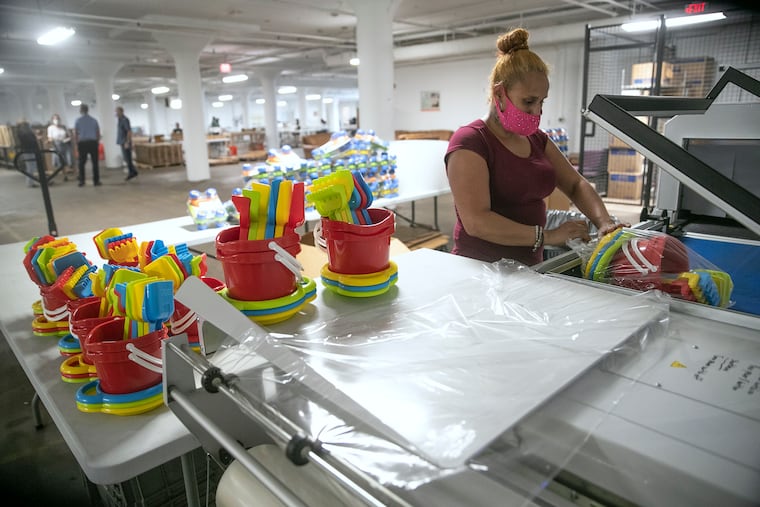Baker Industries provides jobs to workers who are often overlooked by other companies
Lisette Morales and many others left incarceration or addiction behind, and rejoined the economy through Baker Industries, which is hiring.

Recently released parolees. People who are homeless. Adults who are disabled or in recovery from drugs and other addictions.
Many employers would never hire these folks. But Baker Industries does. And they’re looking to hire more.
Workers at nonprofit Baker perform light industrial work: packaging, assembling, kitting, shrink-wrapping, and mailing for over 80 companies across the Philadelphia region. The work is performed by traditionally hard-to-employ adults at either Baker’s airy, modern, refurbished factory in Kensington or at its second site in Malvern. Before the pandemic, Baker staffed up about 100 people. Now, the company employs only about 55.
“Many of our employees couldn’t come back because of fears of the virus, or they lacked child care, or because of the generosity of unemployment benefits,” said Dan Porter, Baker’s sales and marketing manager.
So Baker is looking to bring more employees on board. Its long-term goal remains the same: Train its workers in the $8-an-hour entry-level job long enough that they can move on to higher-paying jobs, at Baker or at for-profits elsewhere.
While the pandemic badly hurt some of Baker’s customers — such as the promotional-products and small-gift manufacturers for conventions and trade shows — “others are going gangbusters,” said Baker’s president, Rich Bevan. Crazy Aaron’s, for example, which is producing kids’ putty and other toys, Bevan said. Still others, such as those that produce industrial umbrellas for utility workers doing outside repairs, never stopped manufacturing.
Because so many manufacturers around the country have closed for good, Baker Industries is receiving orders from new customers as far away as the West Coast. “We are getting calls from around the country from customers whose suppliers are no longer operating,” Bevan said. “We are filling that gap.”
“We were big enough to stay alive, and now we’re short-staffed,” Bevan said.
His workers are trained in job readiness, goal-setting, managing change, interviewing skills, how to manage conflict in the workplace, and introduced to art and photography through fun activities like staging plays and creating displays around the factory floor.
“I love this place and this job,” said Marilyn Perez, 36, a North Philadelphia resident who came to Baker from a halfway house. “You don’t feel judged.”
Kalil Brown, who once wore an ankle monitor, came to Baker earlier this year after his probation officer reached out to the company on his behalf. He now handles all of Baker’s shipping and receiving.
“I’m trying to get more people to come work here,” said the Germantown native, 26, while he oversaw the packaging of face masks and sanitary kits.
“It’s a good environment for getting back on track and training to go to a higher-paying job."
Lisette Morales, 53, who lives in Lafayette Hill, once worked in steamship logistics. Then she hit a bad spell and wound up incarcerated. Three years ago, she was hired at Baker as an administrator and is now the company’s manager of operations.
“I’ve lived this and I know the stories [of fellow employees]; I get emotional just thinking about it,” Morales said, with tears in her eyes and a laugh behind her face mask.
There are limits on hiring at Baker, she said: Those with assault, weapons, or child-abuse charges are not eligible for employment there.
Baker Industries was founded by Charles and Louise “Weezie” Baker, who are now in their 90s, to employ their adult son Justin, who had intellectual disabilities. In 1980, the Bakers opened a small direct-mail business in their garage that could provide jobs for Justin and other adults with disabilities.
They were pioneers in what’s now a trend of parents starting businesses to employ their adult disabled children who, after aging out of the education system, are unable to find work in a mainstream setting. Other such local employers include businesses like New Avenue Cafe in Havertown and Classic Rock auto detailing in Richland.
At Baker, employees participate in workshops, coaching, and training designed to help increase their career potential. In both 2018 and 2019, 25 to 35 employees annually moved on from Baker to higher-paying, living-wage jobs in the mainstream economy. “That’s important, because we want them to make $15 an hour,” Bevan said.
Baker’s landlord, Shift Capital, is also an unusual one. Shift bought and renovated the Kensington space at 3630 I Street, and also leases space in the area to Goodwill, which runs a similar return-to-citizenship program.
Shift Capital is what’s known as a “social impact” investor, with the double bottom line of doing well while doing good.
“The more aligned organizations we work with, the better,” said Jeff Kahn, a Shift Capital partner.
“Jeff was instrumental in Baker locating in this property,” said Bevan of the Kensington site. “They encouraged us to sell our old building and lease this new space, which has worked out beautifully.”